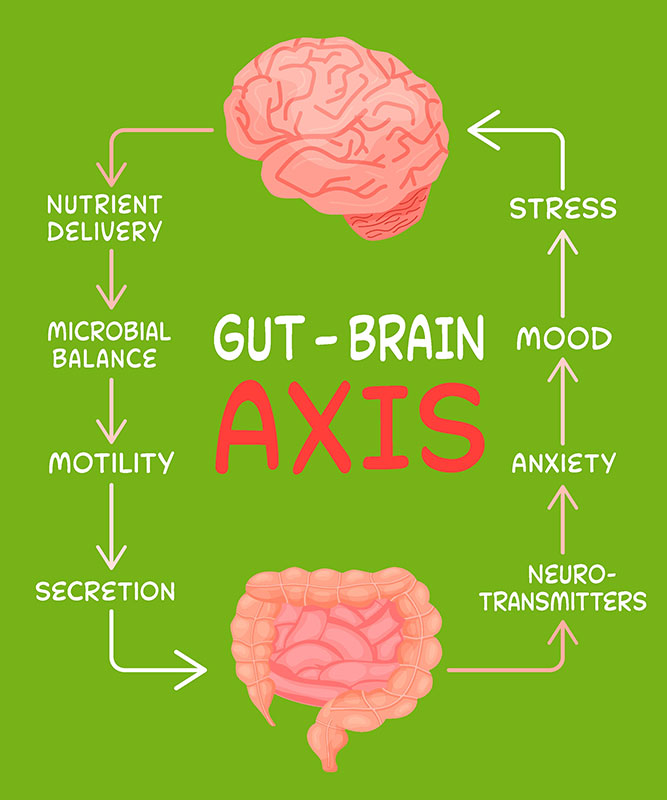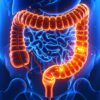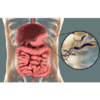
When it comes to cognitive concerns or mood disorders, you may think your brain is entirely responsible for how you think and feel. Though that is sometimes the case, your gut may actually be in the driver’s seat more than you think. Weird, huh?
Studies have shown an intricate link between gut health and brain function. When you have poor gut health, it can impact the way your brain operates, leading to changes in your mood and memory. In this article, we will explore the gut-brain connection in more detail.
The Link Between Gut and Brain Function
A common misconception is that what happens in the gut stays in the gut, but that simply isn’t true. I mean, your gut isn’t Vegas. Chronic or ongoing digestive issues can impact many systems in your body, including your brain. Our gut is home to trillions of bacteria, fungi, and other microorganisms, collectively known as the gut microbiome. These microorganisms play a crucial role in various functions of our body, including digestion, absorption of nutrients, immune system regulation, detoxification, and yep, you guessed it, brain function.
This intrinsic connection is thought to exist for a number of reasons, the first being the nutritional implications of poor gut health. When you have digestive issues, you don’t absorb nutrients adequately, which can ultimately have cognitive effects.
The second association between the gut and the brain is a physical one – the vagus nerve, a large nerve that runs from the base of your skull down into your gut, providing two-way communication between the brain and the gut. Numerous studies have linked gastrointestinal issues to the vagus nerve and this connection may be why so many people with gastrointestinal issues also suffer from mood disorders that affect their daily lives.
A third way that your gut can influence how you think and feel is via the bacteria that are present in your colon. Ever have sugar cravings that seemed to pop up out of nowhere and were practically impossible to satisfy? Guess who that was… likely some harmful overgrown bacteria that loves sugar was making that request. They’re persistent too. They get what they want.
Mood Disorders
Research links gastrointestinal problems to depression. This mechanism at play is not fully understood, but researchers do know that there is a close relationship between poor gut health and your mood because some of your neurotransmitters are actually produced in the gut. When you are unable to absorb nutrients because your digestive system is not operating properly or your gut is unable to produce these feel good hormones, it can increase the likelihood of depression.
Poor nutrition and stomach issues can also lead to other mood disorders, like anxiety and panic attacks. When you have nutritional imbalances due to malabsorption or intestinal issues, it can make you more likely to experience disorders that can be disabling if not addressed.
And again, your gut bacteria are at play here as well. Overgrowth of harmful bacteria is connected with mood disorders like anxiety, depression, or panic attacks. Yep, I’m looking at you, H. pylori and Candida.
Nervousness or Anxiety
Just as the gut influences the brain, the brain can influence the gut, which can be seen in the way that nervousness or anxiety often leads to an upset stomach: Just think back on a time when you felt nauseous during a particularly stressful experience… like giving a speech in front of hundreds of people and all of a sudden your gut is like: Hey. Bathroom. Now.
If you feel digestive symptoms during times of anxiety, it’s because your brain is sending stress signals to your gastrointestinal system, a direct example of the way your gut and brain are connected and how they impact each other’s functions.
Brain Fog and Memory Issues
Brain fog can be another cognitive effect of poor gut health. When your body is unable to get the nutrients that it needs due to insufficient absorption. And it’s way more than just poor nutrient absorption. An imbalanced gut microbiome can affect the way that you process thoughts and information and it can lead to brain fog and memory loss.
So, what does this all mean? There is still much to learn about the gut-brain connection, but the evidence so far suggests that gut health is crucial for cognitive function and the overall health of your brain.
Brain fog, memory issues and mood disorders are so common with the presence of certain bacteria, but you don’t have to suffer. Feeling amazing is as easy as reaching out to a gut health specialist that can diagnose and address your gut health imbalances.
Gut Health EverVital
Mood disorders and brain fog are directly related to poor gut health. At EverVital Nutrition, we are medical professionals and are experts at diagnosing and treating gut-related symptoms just like yours. Let’s get to your root cause! Book your FREE gut assessment now!












